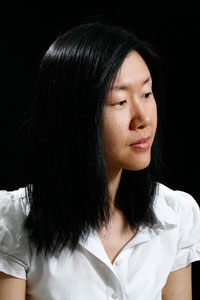How would you feel if someone pointed a finger at you and said: "You are nak phaen din"? A very strong and hurtful remark, isn't it? Meaning "burden to the land", the term is normally used toward a person who is perceived as scum for causing so much trouble to society.
Two weeks ago, this word was widely used on social media to lash out at the antimilitary Future Forward Party (FFP) spokeswoman, Pannika Wanich. The trigger was the alleged lèse-majesté photos that she posted on Facebook nearly a decade ago.
#EChorNakPhaenDin became one of the top-trending hashtags after the widespread sharing of her 2010 graduation photos on social media. One of the photos shows her and five classmates in graduation gowns and one of them points his index finger to an image of the late King Bhumibol while she looks on.
Angry with their gestures, which they deemed as very disrespectful to the late king, many people took them to task on social media and branded them antimonarchists.
The controversial photos were first shared by Parina Kraikup, a female MP from the pro-military Palang Pracharath Party who also wrote: "E Chor nak phaen din" on Facebook, accusing Pannika of insulting the monarchy and calling for her prosecution. Parina had a little spat with her earlier and called her by her nickname, "Chor", but added to it the derogatory prefix "E".
Pannika then posted a long statement on her Facebook to apologise to the public for making them feel "uncomfortable" with the photos, which she admitted to be inappropriate.
She claimed that she took the photos to mock the political climate at a time when the monarchy was used as a tool to destroy political opponents. She insisted that she and her friends believed in a democratic system, with the king as the head of state, and pleaded with her detractors not to use the monarchy issue to attack her politically.
Even though she received moral support from netizens, with the #SavePannika hashtag surprisingly rising to No.1 on Thai Twitter the following day, many called her explanation a lame excuse and dug for more of her posts to prove their theory that she was indeed antimonarchy.
Then we saw a number of well-known figures coming out to directly criticise her on their Facebook pages. Among them were alumni of Chulalongkorn University's Faculty of Political Sciences, where Pannika graduated, former university lecturers, social activists, authors, artists and doctors.
They shared the same feelings that they were upset and hurt and believed that the photos showed Pannika's true self. They also wanted her to leave the country, citing that she didn't love or respect the late King. Many others jumped on the bandwagon and verbally attacked her with cruel comments and even curses on social media.
It's hard to believe that an old photo could cause such a big wave of hatred from people from all walks of life who insisted that they acted out of the love they had for the late king and that it had nothing to do with politics.
We can't deny that what they did is a form of an antimonarchy witch hunt -- a practice that should no longer find its place in these modern days when we are supposed to be open-minded and listen to different views. It's sad to see people turn hostile to someone just because that person might not love the monarchy in the same way they do.
Many Thais might be asking why we have to tolerate this kind of person when they insult our beloved king, who had done so much for his people and the country.
I know that it's not easy to do. But we have the lèse-majesté law to protect our revered institution, so it's better to just let the authorities do their job on the matter.
From a spiritual viewpoint, I see no point in harbouring hatred for any of them, as they are too blind to see the values and virtues of the institution and, worst, are unknowingly allowing the wrong views to take them over and are degrading themselves altogether.
With this crippled side to their souls, it's hard to imagine that they would be able to lead their lives on a virtuous path themselves. Isn't this bad enough for them?
King Bhumibol was the father of the nation -- the centre of love for all Thais. He didn't hate anyone, even those who bore ill-will toward him. He never told us to love him but taught us to love one another.
It would be so much better if we could learn to forgive his wayward children, turn our hatred into tolerance and wish them to come to their senses soon. This will show that we love the monarchy in a constructive way.
Patcharawalai Sanyanusin is a writer for the Life section of the Bangkok Post.
